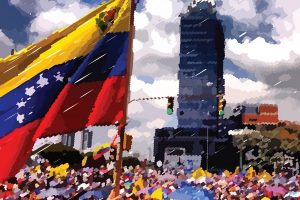One country’s crisis is another’s sparring session
January 31, 2019

Last week in Venezuela, following a highly disputed election, Juan Guaido, a lawmaker from the National Assembly, swore himself in as interim president. Rallies to depose President Nicolás Maduro soon followed. For many in the U.S., this was a first introduction to the affairs of the Latin American country. As is the case every time a new controversial issue comes into national discussion, most Americans believe we have all the right answers, and this issue is no different. Americans have taken this critical situation and turned it into a play-thing — a validation of their own beliefs.
Following President Trump officially recognizing Guaido as the legitimate president of Venezuela, Americans across the nation decided to voice their opposition to the president’s decision on Twitter. From movie directors to your everyday college student, everyone believed they knew the “truth” about the situation in Venezuela.
So, the US is enabling an actual coup in Venezuela.
If you’ve been worried about Russian bots influencing elections here, I’d hope you express outrage about this.
— Boots Riley (@BootsRiley) January 23, 2019
This situation did not pop out of nowhere. This moment was the result of six years of unstable tension within Venezuela. The nation has been in a constant state of turmoil, but U.S. media coverage never caught the traction until Trump’s announcement.
For most Venezuelans living in the U.S., we have become well-versed on the situation. Constant Whatsapp messages have not only kept friends and family in contact but have also allowed the voiceless the ability to record the realities of a regime that has recklessly taken advantage of its citizens.
As for Venezuelan-born sophomore Annelies Smilde Romero, the discussion on social media has her growing weary.
“The Chávez-Maduro regime has committed heinous human rights violations, has an immense amount of political prisoners, have been caught in numerous corruption scandals,” Romero said. “I have seen many people in the left saying that the U.S. is trying to knock down a ‘democratically-elected’ government. Instead of trying to understand what is happening in Venezuela, viewing within its context, many people are simply using the country and its situation as an example in an argument for their political views.”
The “truth” is that with closures of 50 radio stations, at least 120 killed and more than 1,177 wounded during protests, inflation through the roof, shortages of medical supplies and a orchestrated dissolution of the national assembly, the citizens have little to no access to food, free speech, medicine and hope.
So, before you fire up your Twitter, ready to decimate the opinion of someone you do not agree with, think. Forget about Trump. Forget about politics. Think about families separated by the actions of a man desperate to cling to power in a nation diseased with economic failures and corruption. I do not know what solves the crisis in Venezuela, but every day that nothing is done to right the wrongs committed by the Maduro regime is another day that citizens go hungry. Hunger is not political. Health is not political. Humanity is not political. Think before you tweet.






















Leave a Comment